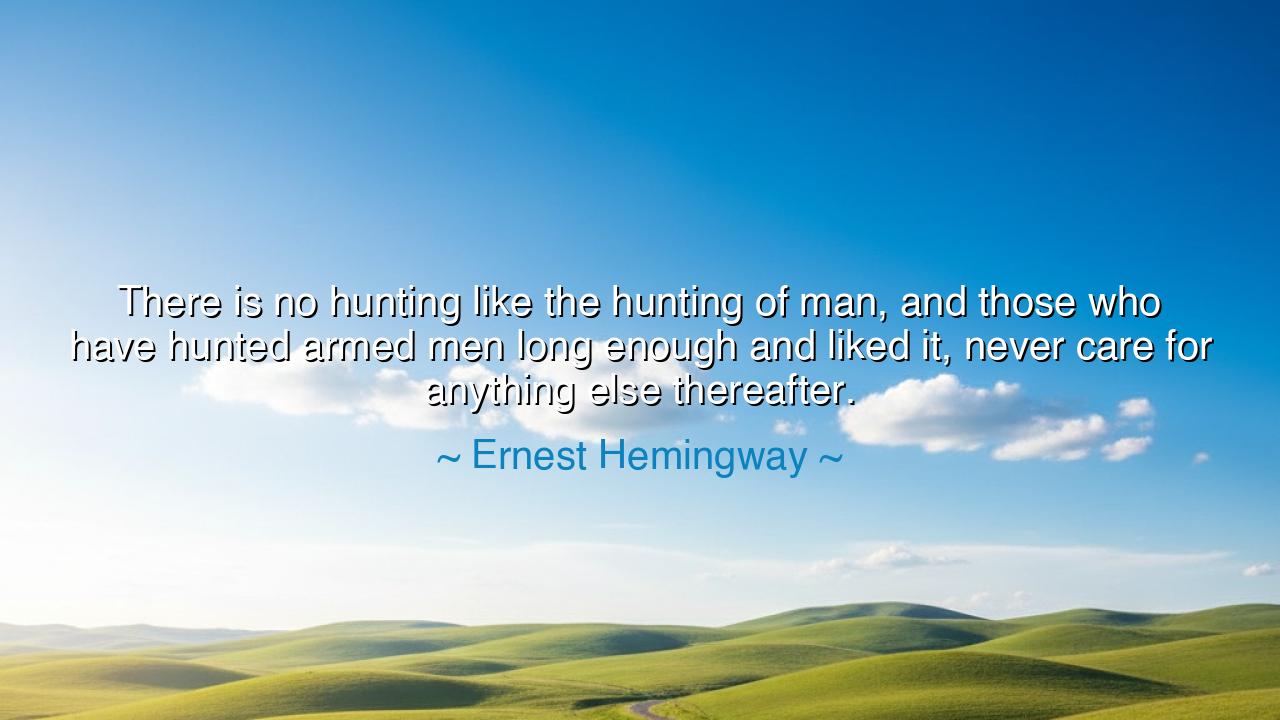
There is no hunting like the hunting of man, and those who have
There is no hunting like the hunting of man, and those who have hunted armed men long enough and liked it, never care for anything else thereafter.






In the heart of every warrior, every hunter, and every adventurer, there resides a deep understanding of the primal pull of the chase—the thrill that comes with pursuing the elusive, the dangerous, the untamed. Ernest Hemingway, a master of capturing the essence of human desire and the darkness that dwells within, spoke these words: "There is no hunting like the hunting of man, and those who have hunted armed men long enough and liked it, never care for anything else thereafter." In these words lies not just the thrill of the hunt, but a deeper, darker reflection on the nature of violence, war, and the human soul. The hunt for man, unlike any other pursuit, leaves an indelible mark upon the hunter, transforming them in ways that are impossible to undo.
Consider, O seekers of wisdom, the ancient hunters who stalked the forests for their prey, where the chase was a matter of survival, of life and death. The great heroes of old, such as Hercules or Odysseus, sought not only to conquer beasts, but to test their strength, their resolve, and their courage. Yet there is a difference between the hunt for game and the hunt for a man. The chase of another human being carries with it a darkness, a loss of innocence that does not come with hunting mere animals. In the act of hunting men, the hunter loses something of their own humanity, something that once was pure, and it is replaced with a thirst—a thirst for dominance, for control, and for the destruction of the other. This is the deeper truth that Hemingway speaks to.
The history of warfare provides numerous examples of this transformation. Look, for instance, to the ancient wars fought by the Greeks—from the Trojan War to the Peloponnesian War. In the heat of battle, the soldiers fought not just for glory, but for the satisfaction of their own instincts. The Achaeans of the Iliad reveled in the bloodshed, the pursuit of victory over the other men who stood against them. But there is a price to be paid for such a pursuit. Achilles, that great hero of Greek myth, was driven by the desire for honor, but also by a deep, uncontrollable rage that led him to hunt and kill with little regard for the consequences. Though Hemingway’s words speak of hunting men with arms, the psychological shift—the transformation that happens in the heart of the hunter—has long been known to those who have fought in battle.
The historical examples are endless, from the soldiers of ancient Rome to the warriors of Genghis Khan, who hunted and killed with great efficiency, driven by a desire for conquest and power. Killing, once a necessary act of survival, became something else when humans were not just fighting for territory, but for the thrill of domination. The hunt for man, whether in the name of war, justice, or vengeance, creates a hunger—a desire that is difficult to satiate. Once a person has tasted the victory that comes from hunting another human, once they have felt the rush of power that comes from taking another's life, they are changed. No other pursuit—no other game—can compare.
Consider the example of Ernest Hemingway himself, whose own experiences in war, as well as in his life as a writer and adventurer, informed the depth of his understanding of this theme. Hemingway was no stranger to violence—both in his personal life and in the characters he created. In works such as "A Farewell to Arms", Hemingway explores the disillusionment of war, the transformation of men who are irrevocably changed by their involvement in it. His characters, like Frederic Henry, are often marked by the trauma of their experiences, haunted by the fact that their souls can never return to the purity they once had. Hemingway’s words echo the darkness that lingers after violence, the hollowness that remains after one has partaken in the hunt for man.
And so, O children of the Earth, the lesson here is not a glorification of violence, but a cautionary tale. The pursuit of dominance, whether through the act of war, conflict, or hunting, leaves scars that run deep. Just as the ancient warriors were transformed by the bloodshed they witnessed, so too are we. The thrill of the hunt—when it is for man, rather than beast—can take us into dark places, where we lose our humanity in pursuit of something far more dangerous. While we may think that the victory of one is the triumph of all, the reality is that the true victory lies not in domination, but in understanding and peace.
So let this wisdom guide you in your own life: resist the lure of violence, of the hunt for power, and seek instead the peace that lies in understanding, in connection, and in the shared journey of humanity. The true strength of a person is not in their ability to dominate, but in their ability to build and to heal. Whether in the world of nations or in the smaller struggles of daily life, remember that the pursuit of peace is the noblest of all, for it is through unity, not conflict, that humanity finds its highest calling.






AAdministratorAdministrator
Welcome, honored guests. Please leave a comment, we will respond soon